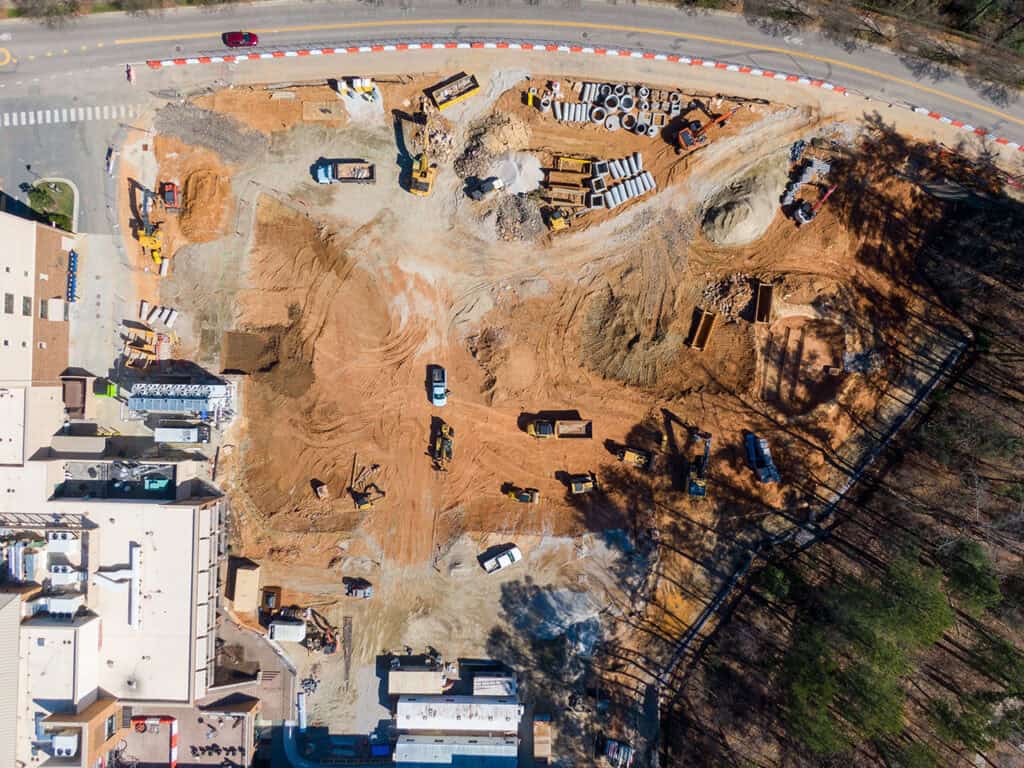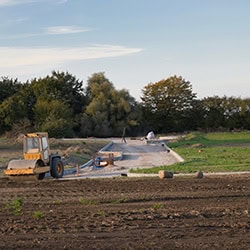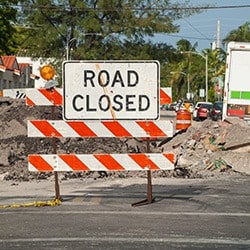Eminent Domain Attorney Raleigh, NC | Raleigh Eminent Domain & Condemnation Lawyer
Trusted Eminent Domain Attorneys Protecting Property Owners’ Rights Across North Carolina
After receiving a land condemnation complaint in Raleigh, NC, too much is at risk for a commercial property owner to face eminent domain alone. Raleigh eminent domain cases involving high-stakes, high-value commercial property are not your “normal” cases; they are complex and require a professional, results-driven approach. The government has its own team of attorneys and experts on their side. At Henson Fuerst, you have our team of qualified lawyers that are experienced in representing fellow commercial property owners against the government. If you need assistance with an eminent domain matter, contact our team by calling 919-781-1107 or by submitting a free case evaluation form online.

David Henson
Attorney
Anne Duvoisin
Of-Counsel
Chris Beacham
Attorney
About Our Eminent Domain Practice
As a boutique division of Henson Fuerst Attorneys focused solely on commercial property eminent domain cases, our lawyers are selective with the condemnation cases we accept. Given the unique needs and legal implications of commercial property condemnation cases, we limit our caseload to dedicate the time and resources each case demands. When you trust our eminent domain practice with your Raleigh eminent domain case, you can rest assured that our law firm will give it the individualized, undivided attention it deserves.
We take our time to get to know the unique intricacies of your case to fight for the best possible outcome. In addition, we work as a team to combine our skills and insights to become a fighting force against various government entities. This is displayed by our proven track record of results for our clients. If you're facing land condemnation, contact our team to see how we may be able to help.
Types of Clients Our Lawyers Represent in Raleigh, North Carolina
Our lawyers represent commercial property owners of various sizes, including:
- Convenience Stores
- Shopping and Strip Centers
- Retail and Office Investments
- National and Local Restaurants
- Industrial and Manufacturing Facilities
- Automobile Dealerships
- Commercial Property Developers
- Manufactured Home Communities
- Real Estate Developers
- Residential Developers
- Multi-family Apartments
- Mixed-use Properties
- Billboard Owners and Companies
- Cell Tower Providers and Lessors
- Churches
- Farms
- Hotels
About Our Fee Structure
Our condemnation lawyers handle the majority of cases on a contingency fee basis, meaning our payment is contingent upon securing compensation exceeding the initial offer from the government. We will only receive a payment if we recover additional compensation on your behalf. If we do, our fee amounts to one-third of the surplus attained in resolving the case.
Take, for instance, a scenario where the Department of Transportation offers $150,000 for damages related to a property taking. Following litigation or trial proceedings, we settle the case for $300,000. In this example, our attorney fee would be one-third of the additional amount acquired, totaling $50,000.
Depending on the circumstances of a case, this fee structure may not be applicable or advisable. In some cases, we may represent landowners on an hourly basis. Our North Carolina condemnation lawyers will help determine the best course of action for you.
Are There Any Exceptions to This Fee Structure?
An exception to this arrangement arises in inverse condemnation cases, where we litigate against the government for land seizure without providing proper compensation. In such cases, attorney fees are typically calculated as a percentage of the total recovery obtained by the eminent domain lawyer. In many North Carolina inverse condemnation cases, property owners may also be eligible to reclaim attorney fees from the defendant.
Additionally, there are circumstances in land-taking cases where eminent domain lawyers and paralegals operate on a flat hourly rate. Typically, the lawyer only works on parts of your case in these instances.
Case-Related Expenses
North Carolina-licensed eminent domain attorneys must clearly distinguish between case-related expenses and their fees. This regulation serves various purposes, notably preventing lawyers from providing clients with incentives to retain their services. Therefore, we meticulously track all expenses specific to a case throughout its duration, including appraisals, expert witnesses, court filing fees, and other out-of-pocket costs. We do not include or charge our clients for internal expenses such as mileage, phone calls, postage, transcription, or photocopies, as these are appropriately covered within our fee structure.

The Eminent Domain Process
You can think of the eminent domain process as having two main parts:
1
The Taking of the Property
The first stage involves the government or a condemning authority notifying affected parties of the taking. In most eminent domain cases, the condemning authority must demonstrate that the taking is for a public purpose, such as infrastructure development, public utilities, or urban renewal.


2
Providing the Property Owner with Just Compensation
The second stage revolves around determining fair compensation for the property owner whose land is being taken according to state and federal law. The U.S. Constitution's Fifth Amendment mandates that private property cannot be taken for public use without just compensation. However, what constitutes "just compensation" in eminent domain can vary and may include factors such as the property's fair market value, damages to any remaining property, relocation costs, loss of business or rental income, and other considerations.
Typically, both parties engage in negotiations to reach a settlement. If an agreement cannot be reached, the matter may proceed to court, where a judge or jury will decide on the appropriate compensation amount based on evidence and expert testimony presented by both sides.
How is “Just Compensation” Determined in an Eminent Domain Case?
According to the United States and North Carolina Constitutions, when the government acquires land, the property owner has the right to receive fair compensation for the taken property. This compensation is typically determined through one of three methods:
Market or Comparable Sales Approach
This approach involves comparing the subject property to similar, recently sold properties. Various factors are considered, such as the physical characteristics of the property (e.g., size, shape, topography), zoning regulations, sale conditions, financing terms, location, access to utilities, and any legal restrictions.
Cost Approach
The cost approach entails evaluating the expenses associated with reproducing or replacing the property's improvements, adjusted for depreciation and the land value.
Income Capitalization Approach
The income capitalization approach assesses the property's potential earning ability based on the capitalization of income to set the value.
In each of these methods, evaluating the land based on its highest and best use is essential.
The concept of highest and best use in eminent domain, as outlined by the American Institute of Real Estate Appraisers in The Appraisal of Real Estate (9th ed. 1987), refers to "the reasonably probable and lawful utilization of vacant land or an improved property that is physically feasible, appropriately supported, financially viable, and leads to the greatest value."
Stay Up-To-Date with the Eminent Domain Lawyers at Henson Fuerst
Our North Carolina condemnation attorneys strive to keep our community educated and informed about the latest trends and events regarding land condemnation and eminent domain. Browse our most recent blog posts here:



